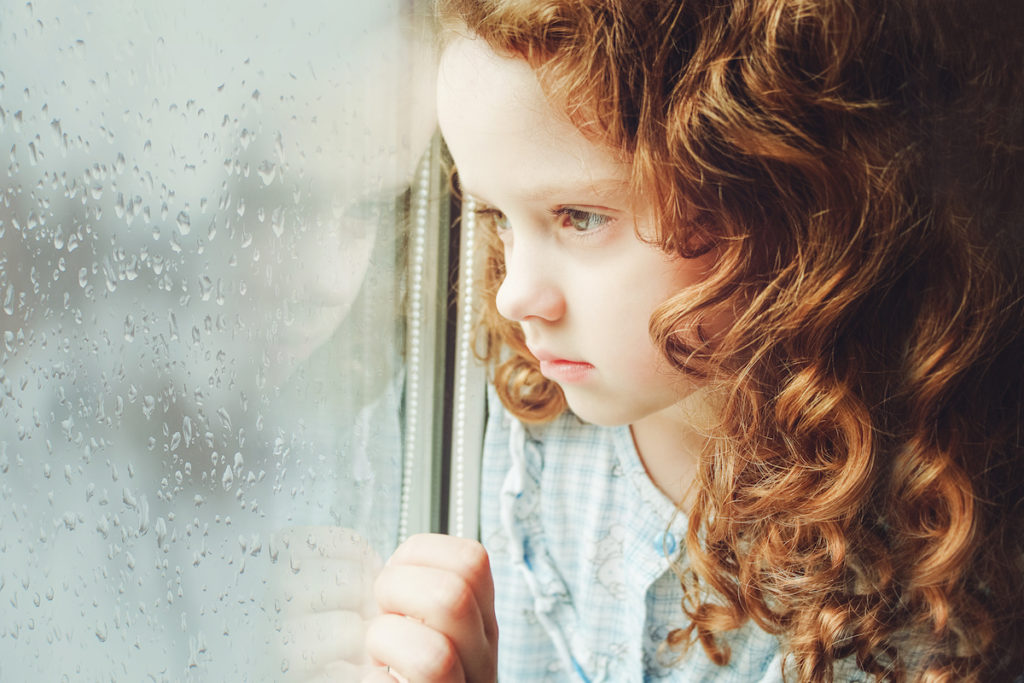Research has shown that the most damaging part of divorce for children is involving them in loyalty binds. A loyalty bind happens when a child must make a choice that will be wrong with one parent and not the other. The child feels caught in the middle between parents. Basically, they get the message that it is not OK to love their other parent. This is just one thing that contributes to negative effects of divorce on children.
Here is a list of 7 other things parents do—consciously or unconsciously that contribute to negative effects of divorce on children, including stress and pain:
1. They carry messages:
When parents avoid communicating with each other because they want to avoid conflict, it is convenient to ask the child to relay a message. For example, “Tell your mom that I want to switch weekends this weekend.” Or “Tell your dad to make sure you have your homework done when you come home.” Or “Let your mom know that I will be bringing Trixie (a significant other) to your school play.” Parents have no idea how uncomfortable these messages make the child feel.
2. They put the children in the middle of financial issues:
It is tempting for parents to be critical of how their ex spends money, and then talk about to their children. Little expenses not clearly specified in support orders, such as a field trip or extracurricular activities, should not be argued in front of a child. For example, if a child asks his parent—the parent paying child support for money, that parent should not respond with something like, “Ask your mother. That’s what I pay child support for.” This kind of response will surely contribute to negative effects of divorce on children. The child might feel stressed, sad, guilty for asking for the money, angry, or develop low self-esteem.
3. They put down the other parent.
When a parent makes critical comments about the other parent, especially about their character, the child is stressed because that parent is part of them, and subconsciously they apply the criticism to themselves. Little things, like thoughtlessness, frugality, cautiousness, insensitivity etc. can be mentioned in throw away comments to the children. “There she goes again, getting you the cheapest clothes.” Or “He never thinks of anyone but himself.” It is risky for the child to defend the parent being criticized, so they usually stay quiet, and internalize the pain.
4. They quiz the child about the other parent’s life.
When a parent does not want to talk directly to their ex, they ask their children questions. This is prominent when their ex has a new romantic partner. When the questions involve their ex’s personal life and are not about safety or practical matters, the child is put in a position of being a spy. Examples are: asking how much time the other parent and his or her partner spend together, what they do, where they sleep, how affectionate they are, what they say about you, etc.
Putting a child in this position can cause him or her to feel guilty for betraying the other parent, confused (in other words, why does Mom care so much about Dad’s new girlfriend? Maybe she wants to get back together), or unimportant. In other words, why isn’t Mom asking me questions about me?
5. They show a lack of interest in the child’s excitement when talking about what they did with the other parent.
When a child returns from time with their other parent, they often want to talk about how much fun they had, or what they did that was exciting. If their parent is threatened by this and does not feel very secure about their own relationship with the children, they might have a hard time feigning interest or enthusiasm. So, they show no interest or are critical. How does that contribute to negative effects of divorce on children? The child could get the message that it is not OK to love their other parent. For young children it would be confusing, and for older children they may learn to keep important feelings from that parent.
6. They have a critical attitude toward their ex’s new partner.
When a parent gets into a new relationship, their ex is almost always keenly interested in the new partner and is quick to be critical or to perceive a threat to their children from this new relationship. This is more likely if one parent is still single. That parent might understandably have safety concerns about a new partner, as well as concerns about how kind and sensitive this new person is to the children.
Even without these concerns, showing a lack of interest or criticism when the child is describing activities with their other parent and the new partner communicates disapproval. The negative effects can be that the child starts resenting the other parent, shuts out the new partner, and/or doesn’t want to go to the other parent’s house because they feel disloyal for liking the new partner.
7. They lack friendliness or even cordiality when speaking to each other.
Children want their parents to be friendly and even loving toward each other (many secretly wish for a reunion). When there is conflict or just a lack of friendliness, the children are stressed or disappointed. Kids just want to feel “normal,” like their friends whose parents are still married.
Seeing animosity between their parents causes so many negative effects, including hopelessness, feeling sad, feeling worried about one or both of their parents, feeling angry (like, “why me?”), and feeling like their parents care more about being mean to each other than about being nice to their own children.
For these seven situations, the parent will continue to be unaware of the impact on their children because the children do not show obvious discomfort or stress.
So, what can be done to protect children from these loyalty binds and to minimize things that contribute to negative effects of divorce on children?
Children in Between, is a four-hour program designed to reduce loyalty conflicts and help children cope and thrive through divorce. In the course, parents teach their children to use “I” messages, where the child states their feelings and asks for a change.
A simple example: “Dad, when you say mean things about mom, it makes me really uncomfortable. I would like it if you would not say those things to me.” Or “Mom I feel scared when you talk about taking dad to court because I know how much bad fighting will happen. Can you talk to dad and work it out?”
Children in Between includes examples of situations enacted realistically (the video won Telly and W3 awards for excellence), for the purpose of showing parents the damage certain actions can have on their children.Research shows that when parents watch other parents doing something similar to what they do, and when they learn about the stress on children, they stop or greatly reduce these behaviors.
During the course, parents are encouraged to discuss these situations with their children and to give them permission to use “I” messages when they feel caught in the middle. In my family therapy practice I taught young children, 4 and 5 years old, to use “I” messages. I prompted parents to give their children permission to speak up in this way when they were unhappy with their parent’s behavior.
Periodically, parents had to remind their children to use “I” messages since this is not a natural way for most children to speak. In general, teaching your children to recognize their feelings and to talk about them has lifelong benefits that increase emotional literacy and emotional intelligence.
Is it possible that you have been exposing your children to loyalty binds? If so, don’t beat yourself up.
This is a difficult and painful time for you, and most parents do this, even when still married or partnered. It is just more common in divorce and separated families. The good news is, there is still time to make changes to minimize the negative effects of divorce on your children.
Children in Between is a great start. You will be surprised at how a four-hour investment will help you and your children, today, tomorrow and in the long-run. To learn more or to register for Children in Between, visit our site.

Don Gordon, Ph.D is the Executive Director of The Center for Divorce Education, the company that produces Children in Between and other classes to benefit divorced men and women and their children. Dr. Gordon is internationally recognized as one of the top experts in the field of parent/child relationships. For more than three decades his research and work has focused on developing and refining evidence-based family and parenting interventions. He is a past professor at Emory University and is currently an Emeritus professor at Ohio University. Dr. Gordon received his undergraduate degree from the University of Virginia, and master’s and doctoral degrees from the University of Alabama.



















